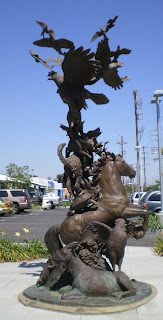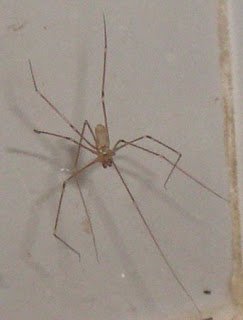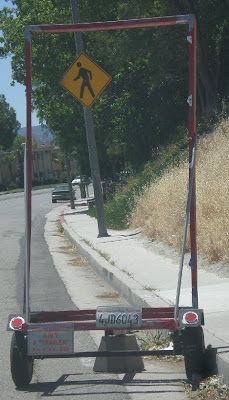 Anyone who uses an automatic sprinkler system wants to know if a broken sprinkler head is allowing all that precious H2O to shoot skyward. When I pass a house that has that problem, I knock on the door and let the people inside know what's happening. Usually, they are grateful for the information and eager to make repairs. My guess is that most wouldn't be as receptive to complaints about what time of day they water or how wet the sidewalk is.
Anyone who uses an automatic sprinkler system wants to know if a broken sprinkler head is allowing all that precious H2O to shoot skyward. When I pass a house that has that problem, I knock on the door and let the people inside know what's happening. Usually, they are grateful for the information and eager to make repairs. My guess is that most wouldn't be as receptive to complaints about what time of day they water or how wet the sidewalk is.So, the Department of Water and Power has issued these official-looking door tags, listing broken sprinklers and three other items that violate our new watering restrictions. They encourage us to nag our neighbors (anonymously) about sprinkling more than twice a week, and sprinkling in the middle of the day, and excess water on the pavement. The other side of the tag offers suggestions for saving water, including the use of "synthetic turf". I haven't seen that around here yet, but no doubt it is coming.
In the meantime, while Valley residents give up their lawns and replace the petunias with prickly pear, other states continue to experience heavy rains, storms and floods. How much better life would be if someone could invent a technology that would make it possible to spread the water around a little more evenly!
 I recently visited the West Valley Animal Care Center on Plummer Street in Chatsworth. The city of Los Angeles no longer uses the term "Animal Shelter"; apparently it's too restrictive, or perhaps not euphemistic enough. This was the first time I had been there since the recent, major renovation, and I was pleasantly surprised. Unfortunately, this will sound as though I am damning it with faint praise: it is now the nicest animal shelter I've ever seen.
I recently visited the West Valley Animal Care Center on Plummer Street in Chatsworth. The city of Los Angeles no longer uses the term "Animal Shelter"; apparently it's too restrictive, or perhaps not euphemistic enough. This was the first time I had been there since the recent, major renovation, and I was pleasantly surprised. Unfortunately, this will sound as though I am damning it with faint praise: it is now the nicest animal shelter I've ever seen. in the wings that are still a bit too young for public viewing. (I recommend adopting an adult cat. As experienced pets, they adapt well to household living, and are generally easier to care for and less destructive than kittens.) The cats looked clean and healthy, and most seemed interested in interacting with visitors.
in the wings that are still a bit too young for public viewing. (I recommend adopting an adult cat. As experienced pets, they adapt well to household living, and are generally easier to care for and less destructive than kittens.) The cats looked clean and healthy, and most seemed interested in interacting with visitors.
 Today is yet another special election in Los Angeles. On the ballot are six propositions relating to taxes and budgets, a runoff for city attorney, and community college district trustees. The polls will be open from 7:00am to 8:00pm. If you don't know where your polling place is, you can find it at
Today is yet another special election in Los Angeles. On the ballot are six propositions relating to taxes and budgets, a runoff for city attorney, and community college district trustees. The polls will be open from 7:00am to 8:00pm. If you don't know where your polling place is, you can find it at  This California pepper tree (Schinus molle) is a volunteer in my garden. Less than two years old, it is already more than ten feet tall. Originally it had two main branches veeing away from the base, but one was damaged by winter storms and had to be cut away. The tree now has about half the volume it would otherwise have had.
This California pepper tree (Schinus molle) is a volunteer in my garden. Less than two years old, it is already more than ten feet tall. Originally it had two main branches veeing away from the base, but one was damaged by winter storms and had to be cut away. The tree now has about half the volume it would otherwise have had. The green bins are for yard trimmings. The blue bins are for recyclable items. The black bins are for (non toxic) trash. This system has been in place for many years. So when our neighbors, Mr. and Mrs. Loud,* stuffed their green and blue bins full of old carpeting, they were the only ones to be surprised that the bins weren't emptied. "I didn't know," Mrs. L claimed later that morning. Luckily for her, the truck handling black bins had not yet arrived. So she waited by the bins, told the driver of the trash truck she had made a "mistake", and got him to empty these. It's a good thing, too, because the Louds' excess trash has a way of mysteriously appearing in other people's bins in the middle of the night.
The green bins are for yard trimmings. The blue bins are for recyclable items. The black bins are for (non toxic) trash. This system has been in place for many years. So when our neighbors, Mr. and Mrs. Loud,* stuffed their green and blue bins full of old carpeting, they were the only ones to be surprised that the bins weren't emptied. "I didn't know," Mrs. L claimed later that morning. Luckily for her, the truck handling black bins had not yet arrived. So she waited by the bins, told the driver of the trash truck she had made a "mistake", and got him to empty these. It's a good thing, too, because the Louds' excess trash has a way of mysteriously appearing in other people's bins in the middle of the night. I photographed these daddy long-legs spiders (
I photographed these daddy long-legs spiders ( Usually found in or around houses, the daddy long-legs is sometimes also called the cellar spider. (It is occasionally confused with a couple of other species that are also sometimes called long-legs or daddy long-legs.) They like to hang upside down from their webs and wait for prey. They eat small insects and spiders. When food is short, they will eat their own kind.
Usually found in or around houses, the daddy long-legs is sometimes also called the cellar spider. (It is occasionally confused with a couple of other species that are also sometimes called long-legs or daddy long-legs.) They like to hang upside down from their webs and wait for prey. They eat small insects and spiders. When food is short, they will eat their own kind.
 Last night someone informed me that the
Last night someone informed me that the 


